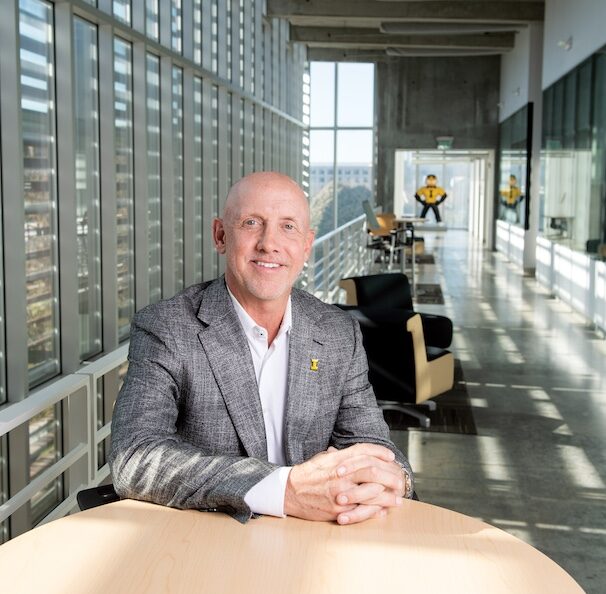Q&A with Jim Lewis, Executive Director, Vaughan Institute of Risk Management and Insurance, University of Iowa
In 2023, long-time insurance industry entrepreneur Jim Lewis was named executive director of the Vaughan Institute of Risk Management and Insurance at the University of Iowa’s Tippie College of Business. With more than 200 insurance companies based in Iowa and fewer than 60 universities in the country offering risk management and insurance programs, Lewis is tasked with inspiring the next generation of insurance and risk management industry minds, leaders and innovators to fuel Iowa’s insurance economy and the global risk management industry.
Lewis is uniquely fit for the task as an Iowa alum, former instructor and someone who has co-founded and led numerous insurance and insurtech companies. He also was the former alumni director for the Global Insurance Accelerator, an international insurance incubator for insurtech start-ups, based in Des Moines.
Recoop’s Chief Distribution Officer Kelly Anonson sat down with Lewis to learn more about the future of insurance and innovation.
Innovation and risk management feel like they can be at odds with one another. What’s your take on insurance industry innovation? Why is it so hard for us to get out of our own way?
No doubt, innovation is really hard for the insurance industry because it’s naturally risk averse. We struggle with it and when we go to start ups and innovators in our industry, we’re typically met with questions and concerns – “Are we willing to take this on?” I’ve found that it can be easier to find more reasons to say no and then ideas get killed. Occasionally you’ll get to do a pilot and evaluate a concept but there are so many naysayers to block the path. If we keep doing innovation this way, the industry will only languish.
How can the industry do a better job of exciting and incentivizing the next generation of risk management and insurance professionals?
We have an aging industry, so replacing the mindset and replacing talent is imperative. It is estimated that 25% of the industry will reach retirement age in just five years. The responsibility falls on all of us to get the next generation educated and ready for change and innovation and offer new ways to explore the industry. We’re trying to inspire more innovative leaders for the future of insurance.
Let’s be honest, students don’t wake up thinking they want to be in insurance. But they do want to make a difference. This is a powerful driver in this generation. It’s their “why.” So we talk about the role of a risk manager making the world safer and more secure. Risk is an essential part of the business world with every investment leading to high returns or substantial losses. We need to do a better job telling and showing how the insurance industry can be a powerful career with heart and purpose.
Heart and purpose are interesting words to associate with the risk management and insurance space. Not every outsider would see it that way, but those of us in the industry certainly do. Do you find this message resonates with students?
Definitely – they want to know that what they are doing is making a difference. But they also want to know they can have a career with options and growth potential. Students today aren’t just thinking about the jobs of today, they’re thinking about the jobs of the future. AI plays a large role in that. So it’s helpful for us to show the wide variety of roles and pathways this industry offers from internal risk management teams and risk management consulting to brokers, agents, actuaries, underwriters, asset managers, accountants and management. When we start showing them the various avenues that exist, they get excited.
Let’s talk more about innovation. As a start-up and as a first-of-its-kind multi-peril product, we had to overcome many hurdles in bringing Recoop Disaster Insurance to the market and education continues. It’s a new concept that blends elements of a parametric product and traditional indemnity product into one to create a solution that helps families protect their financial future when natural disaster strikes. That isn’t always intuitive, how are you challenging students to innovate, realistically?
The market needs more great ideas. My mantra for doing anything is “start with the why.” We know a majority of Americans don’t have the savings to pay for an unexpected $500 expense. They don’t have the liquidity. Natural disasters just don’t care how much money you have, or don’t, in the bank before they strike. That’s why tools like Recoop are so interesting. We need more creative, innovative insurance solutions for consumers and for employers to offer to their employees that provide real benefits with rich support.
How are you connecting students to the “real world” of insurance?
We’ve made a concerted effort to build connections with insurance leaders through guest speakers, experiential learning opportunities, competitions, office visits and other events that help us connect the dots between the academic environment and the business environment. As a business leader myself, I want to be able to choose from a capable, creative talent pool.
We have massive issues we’re grappling with as an industry between climate change, political environments and reduced profitability that requires the ability to adapt and pivot. Our job is to make sure our students are career-ready.
Part of that is about educating our students and providing them with a rich collection of experiences, but it’s also about tuning into the industry and listening to the needs and challenges facing today’s business leaders. It’s a very inspiring time to be part of shaping the future of the risk management industry through the professionals of tomorrow.

